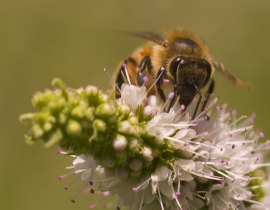Professional Pest Control & Wildlife Management
Honey Bee
The humble Honey Bee Apis mellifera is an industrious worker, they pollinate many of our plants and create a very tasty by-product, honey.
Honey bees typically swarm in May and June, frequently settling in chimneys, roofs, and walls. These swarms usually depart after a few days of rest. However, if they remain for over a week, it is probable they have established a permanent residence. In such cases, the available options are to either leave them be or contact a specialist company that provides live bee removal services. Suffolk Pest Control Company Ltd does not currently provide this service.
If you have a question about Honey Bees or need advice please use the enquiry form, we’re happy to help you.
-
Risks
Like all other members of its family, Honey bees carry a sting however they loathe to use them as their stings carry a barb. Once they have stung a victim the sting will often literally pull out of there abdomin staying put on whoever/whatever they have stung.
If you are allergic to wasps it is highly unlikely that you will also be allergic to bees. It does happen, ask our director Martin who unfortunately is allergic to both.
If you are stung by a bee and feel unwell or are showing signs of hives/rash seek medical advice immediately.
-
Treatment
None offered
-
Life Cycle
Like the social wasps the Honey bee lives in colonies, at the centre of the colony is the queen. She spends her time laying eggs which become sterile workers who’s job it is to feed the hive and maintain it.
The Queen can live for five years before being overthrown by a new Queen, sometimes a hive may split with half of the workers following a new Queen whilst the remainder stays with the original Queen. Swarms of bees are normally found in April and May, they will often attach themselves to a tree branch and can cause some degree of stress if it happens to be in your garden.
A bees hive can contain 60,000 workers and produce a healthy supply of honey over the summer. The honey the bees manufacture from nectar is their winter supply of food. Unlike wasps, which effectively die off each year (only young queens hibernate through winter) a bees nest can continue indefinitely with new queens taking over.
-
Pest Info
- False Widow Spider Removal
- Cluster Fly help
- The trouble with fleas?
- Mole Catching in Suffolk
- Rats in the Garden
- Wasp Nest Control
- Rats in your chicken Coop
- Anaphylaxis
- Bee Swarms
- Becoming a Beekeeper
- Rare Breed Poultry
- Pest Control with Birds of Prey
- Un-marked vehicles available
- Rabbiting with Ferrets
- Myxomatosis
- Poll-Tex Mesh
- Honorary Member Russell Wallis
- Free Rabbit Control



